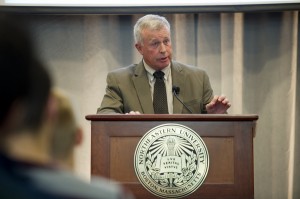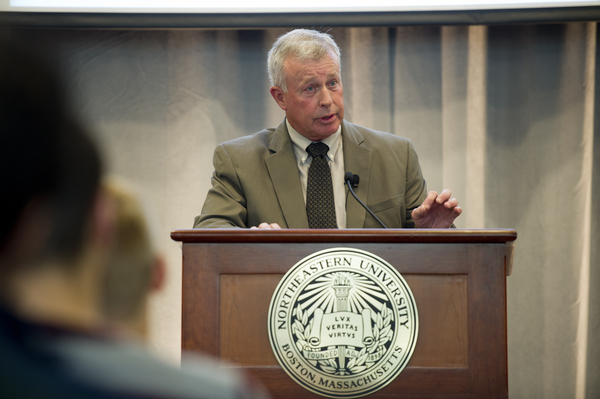
When retired General David D. McKiernan thanked faculty and students for giving up a Friday evening to join him in Northeastern University’s packed Raytheon Amphitheater, no one mentioned it was Thursday. Former commander of US and NATO forces in Afghanistan, as well as leader of all ground forces during the 2002-2003 Operation Iraqi Freedom, Gen. McKiernan is not the type of man people often correct. That is not to say, that McKiernan did not invite dissent in Thursday evening’s address. In his conversational tone, McKiernan warned that his audience might be surprised by what he had to say and encouraged them to express their disagreements as they arose. All the while he must have known that the primarily liberal group of Boston academics was unlikely to find much to disagree with in his diplomatic call for more prudent decision-making by Washington.
The General set the stage for the discussion of the Iraq and Afghanistan wars in an analogy-laden introduction outlining his interpretation of the ideal American model of war. Central to this model was the concept that war should be entered into only as a last resort and only when vital national security interests are at stake. Comparing military intervention to a lobster pot that is, “easy to get into, but hard to get out,” McKiernan followed one analogy with another by relating military experience on the ground to the “pottery barn rule—if you break it, you buy it.”
According to him, it was this “pottery barn rule”, or the obligation to take ownership of damage done, that the US government failed to adequately consider when committing forces in both Iraq and Afghanistan. In the Iraq invasion, the national decision-making lacked an informed understanding of the environment into which armed forces were about to be sent. McKiernan placed the blame for failings in Iraq on a lack of understanding that resulted in what he called two “disastrous Washington policies”—the de-Ba’athification of Iraq and the formation of the New Iraqi Corps. Under these policies, the US disenfranchised all members of Saddam Hussein’s Ba’ath party and put 400,000 former Iraqi soldiers out of work. In the McKiernan’s opinion, these policies stripped Iraq of the only leaders capable of restoring Iraqi civil society, and created a fertile recruiting ground for anti-American resistance.
However, McKiernan’s explanation for the political failings in Afghanistan was more convoluted. To him, Afghanistan typified the “pottery barn rule”. Sent into Afghanistan unprepared for the complexity of the environment and with no exit strategy, the US “broke the china” of the status quo and suddenly the military “owned the problem.” Afghanistan was the lobster pot and though the military had gotten into the pot, it had no strategy for how to get back out. They were doomed to boil.
Stressing the complexity of the problem with which the military was faced, McKiernan used a series of photographs to illustrate the multi-faceted nature of the “human terrain” US forces encountered in Afghanistan. Describing a generation that has known nothing but three decades of war, McKiernan addressed the incidents of “green on blue” violence by discussing the difficulty associated with developing professional leadership in an army built in a single generation. Touching on the insurgency in Pakistan, on historical and cultural differences, on the difficulty of promoting education without security, and on the impossibility of building a viable government under such circumstances, McKiernan concluded by admonishing the American political leadership.
As far as he was concerned, America’s leaders failed to anticipate the environment that would make achieving US goals in Afghanistan impossible. They had access to the information necessary to make an informed decision, yet rushed to commit forces instead of engaging in the educated debate that could have prevented the drawn out conflicts of the “Global War on Terror”. The Global War on Terror was a strategic mistake on the part of the US government. “We can’t wage it everywhere, we can’t win it, and we may have motivated more anti-US aggression,” the General said. In Afghanistan, McKiernan maintained that US expectations were set too high and that they must be lowered to more achievable outcomes in terms of the formation of a viable government and effective institutions in Afghanistan.
The list of post-9/11 takeaways, with which the General concluded, was a series of lessons learned. Though these lessons may sound familiar to those who have taken an introductory class on anthropology or international affairs, they were still refreshing coming from the mouth of a distinguished senior military official. We live in a tribal world, he claimed, in which understanding tribal equities and being in tune with the human terrain of the rest of the world is key to success. Imposing Western values and structures “may not always fit,” and when we debate intervention, we must consider the context of the state in which we plan to intervene. No longer are conflicts contained within the borders of a single country and counter-insurgencies do not work without popular support. Reiterating his firm belief that military intervention should be used only as a last resort, the General took this notion further claiming that even when military intervention is necessary, it is insufficient without the diplomatic and social support of a “whole government approach.”
In a speech advocating informed debate, military restraint, increased cooperation, and cultural understanding, very little was said that had the potential to cause offense. It was not until his concluding thoughts on post-9/11 takeaways, when he pronounced the Global War on Terror a strategic error, did he advocate lowering expectations for achievable outcomes in Afghanistan and prescribed non-intervention in Syria. Then the murmurs of discontent filled the room.
McKiernan looked towards the future with comments on Syria and other potential conflicts. “We debate exit strategies, but we don’t sufficiently debate entry strategies,” he commented. Framing the use of US military intervention in terms of vital national interests, McKiernan expressed his sentiment that the US cannot, nor should it, be policeman everywhere in the world. Quick to note that this did not mean the US should fail to act in cases of human rights violations, McKiernan did stand by his belief that this action should not be military if vital national interests are not at stake.
Ret. Gen. McKiernan’s speech was diplomatic, informative, and refreshing in its culturally sensitive portrayal of US foreign intervention. That said, his comments on the US’s inability to police the whole world and on intervention only in response to a direct threat on national security might have left some members of his audience with a few unanswered questions. Of course, the US cannot and should not be responsible for maintaining global order, but as the UN’s failure to diplomatically curb the atrocities of the Assad regime continues to dominate the news, some might wonder—if not the US, then who? And where does US national security and international security meet in the rapidly globalizing and interconnected world? When does a threat to one people become a threat to all peoples? We can only hope that a sense of urgency will motivate us to proactively find answers to these questions, and that, when we do, it is not too late.
Kelly Grant
International Affairs ’14



